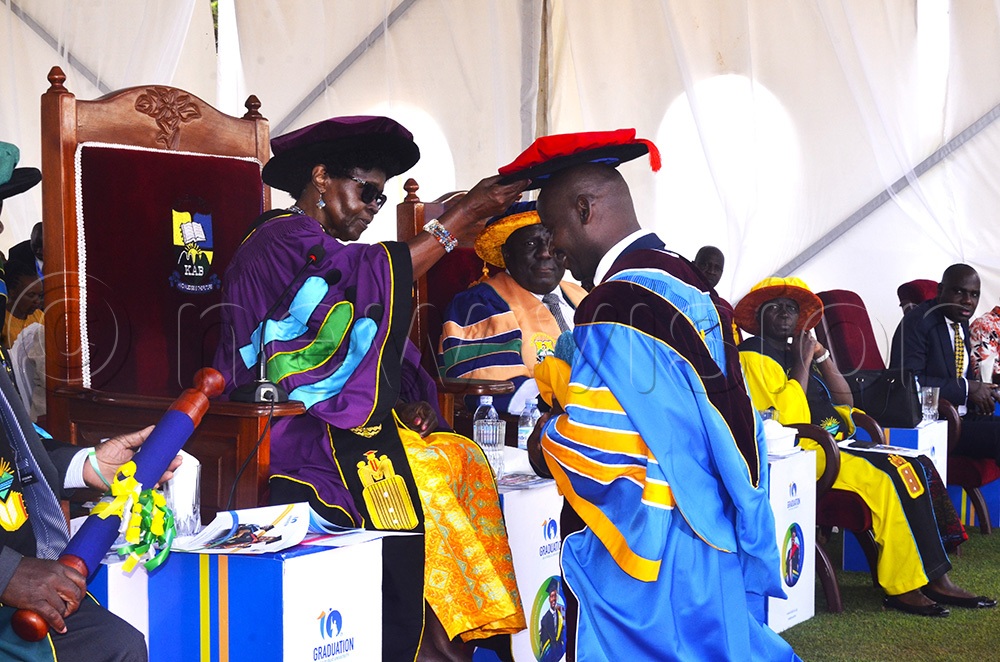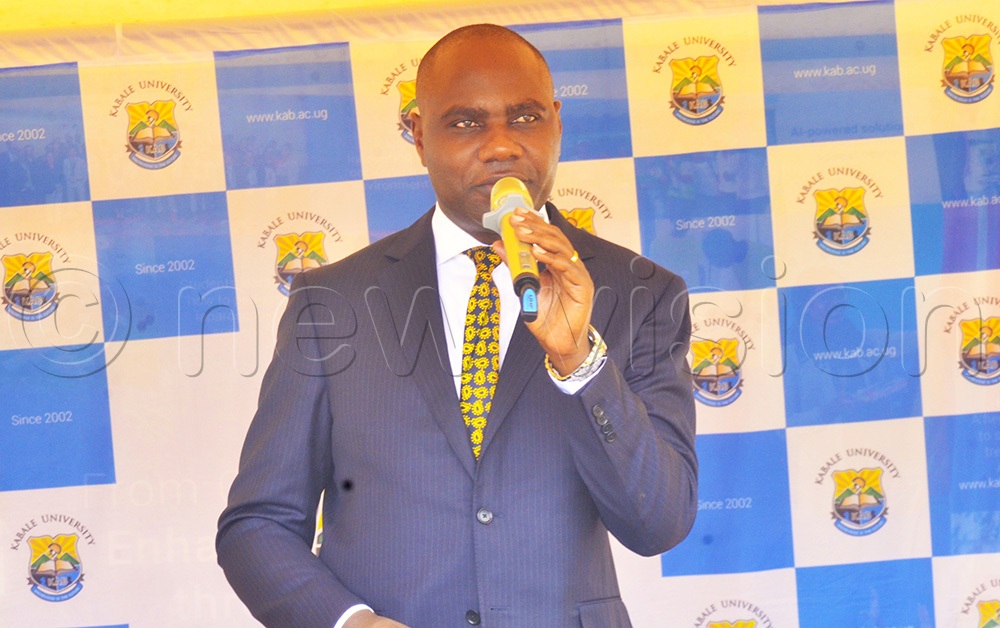Kabale University graduates 1,673 as education PS calls for action on dropouts
Representing the First Lady and Minister of Education and Sports, Mrs Janet Museveni, the PS revealed that while between 1.5 and 2 million children are born annually, only about 800,000 go on to sit for the Primary Leaving Examinations (PLE).
Some of the graduates attending the 10th Graduation ceremony at Kabale University. (Credit: Job Namanya)
By Job Namanya
Journalists @New Vision
KABALE - The Permanent Secretary in the Ministry of Education and Sports, Dr. Kedrace Turyagyenda, has raised alarm over what she termed as an alarming number of school dropouts, describing it as a threat to the country’s socio-economic development.
On Friday, Turyagyenda expressed concern that Uganda’s education system is losing millions of learners along the way, with very few making it through to higher education.
The PS raised the red flag and made the remarks on Friday, while addressing hundreds at Kabale University’s 10th graduation ceremony held at the university’s playground on Kikungiri Hill in Kabale Municipality.
A total of 1,673 students graduated in various academic disciplines, including 7 PhDs, 151 Master’s Degrees, 1,001 Bachelor’s Degrees, 41 Postgraduate Diplomas, 319 Diplomas, 1 Certificate, and 149 Higher Education Bridging Certificates.
Representing the First Lady and Minister of Education and Sports, Mrs Janet Museveni, the PS revealed that while between 1.5 and 2 million children are born annually, only about 800,000 go on to sit for the Primary Leaving Examinations (PLE).
This implies that nearly half of the school-going children drop out before completing primary school.
“The education sector is not performing well in terms of retention. Out of every ten children who begin school, only about four complete the primary cycle, and the numbers drop even further at secondary and tertiary levels,” Dr. Turyagyenda lamented.
She noted that only 7 per cent of learners proceed to tertiary education, a situation she said requires urgent redress.
Causes of school dropouts
The Permanent Secretary revealed that poverty and hunger as leading causes of school dropouts, particularly in rural areas where many families cannot afford meals or basic scholastic materials.
She called upon parents to supplement government efforts under Universal Primary Education (UPE) and Universal Secondary Education (USE) by ensuring that children have lunch at school.
“Education is a shared responsibility. The government provides infrastructure and teachers, but parents must play their part. A hungry child cannot concentrate in class,” she stressed.
Dr. Turyagyenda also urged community leaders, local governments, and civil society organisations to intensify sensitisation on the value of education and to encourage the enrollment of all children, especially girls and those with disabilities. 
Prof Joy Kwesiga, the Kabale University chancellor, recognising Dr Ivan Habaasa during the Friday graduation ceremony. (Credit: Job Namanya)
Call for practical skills and entrepreneurship
While congratulating the graduates, Dr. Turyagyenda encouraged them to view graduation as a foundation for lifelong education.
She urged the fresh graduates to embrace entrepreneurship, innovation, and value addition to bridge the growing unemployment gap in Uganda.
“The job market is competitive. Graduates must be creative and seek to create jobs rather than wait for formal employment. Explore agro-industrialisation, tourism, and small-scale enterprises as ways to uplift your communities,” she advised.
In her remarks, the Vice Chancellor, Prof. Joy Constance Kwesiga, commended the graduates for their hard work and resilience through their academic journeys. She emphasised the university’s commitment to excellence in research, teaching, and community engagement.
Prof. Kwesiga revealed that Kabale University is prioritising improvements in staffing, infrastructure, and digital learning systems, but added that limited funding continues to slow progress.
“We are working to strengthen our human resources and ICT infrastructure to meet the demands of a growing student population. However, sustainable funding remains a challenge,” Prof. Kwesiga said.
She appealed to the Government, development partners, and alumni to support the university through sponsorships, research funding, and partnerships aimed at enhancing the quality of education and innovation.
Appeal for more land and government support
The Chairperson of Kabale University Council, Dr. Adison Kakuru, called upon the Kabale District Local Government to allocate additional land to facilitate the institution’s expansion.
Kakuru said the university plans to develop more facilities, such as laboratories, lecture halls, and staff housing, but these plans have been delayed due to land shortage.
“We are in dire need of more space to create a conducive environment for teaching and learning. We also urge the government to increase our funding to match the rapid growth in student enrollment,” he said.

State minister for Finance (General Duties) Henry Ariganyira Musasizi addresses graduands at Kabale University on Friday. (Credit: Job Namanya)
Guest Speaker Justice Karooli Lwanga Ssemwogerere challenged graduates to strive for academic and professional excellence, reminding them that education must translate into positive social change.
He warned against complacency and the misuse of technology, noting that while digital tools have revolutionised education and business, they can also lead to moral decay if abused.
“Technology should be used to advance innovation and problem-solving, not to erode values. As graduates of this generation, you must lead by example,” Justice Ssemwogerere said.
Government’s commitment to education
The State Minister for Finance (General Duties), Henry Ariganyira Musasizi, reaffirmed the government’s commitment to ensuring affordable and quality education for all Ugandans.
Musasizi revealed that plans are underway to make Universal Primary Education (UPE) completely free, in line with the original goals of the National Resistance Movement (NRM) government.
“Many UPE schools are still charging fees, which contradicts the spirit of the program. The government is working to address this to ensure that no child is left behind,” he said.
He further encouraged the graduates to focus on agro-industrialisation, job creation, and tourism development to help boost Uganda’s economy.
Looking ahead
Kabale University, a public institution chartered in 2015, continues to position itself as a centre of excellence in the Kigezi sub-region and beyond. With its expanding academic programs and increasing student population, the institution is steadily transforming into a regional hub for research and innovation.
This year’s graduation, themed “Education for Community Transformation,” reflected the university’s commitment to empowering learners with skills and values needed for national development.
